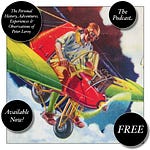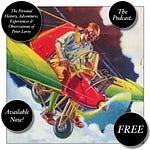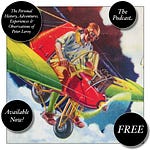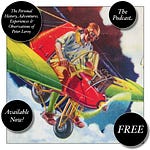GUPPA AND MRS. JONES were much more successful. She worked in her basement, and Guppa sometimes worked there with her, but they wouldn’t let anyone see what they were doing, because they knew that it’s best to keep the rough work out of sight and show nothing until you’re ready. Then, one day, as if they had sprung up overnight, like mushrooms, beautiful otherworldly trees sprouted throughout Guppa’s garden, trees with twisted trunks of many colors, smooth, arching branches, whirling multicolored flowers, and dangling lemon-yellow trash-can lids—waterwillows.
THE WATERWILLOWS appeared in the garden on the day my father discovered that I’d cut the end from the garden hose. I was out at the watchtower construction site, halfheartedly pulling nails from salvageable boards when he arrived wearing a puzzled look. He stood there for a moment with his hands in his back pockets, looking around. He seemed not to be able to decide what was puzzling him.
“Peter,” he asked, “do you know what happened to the nozzle of the garden hose?”
“Huh?” I said.
“Someone cut the nozzle off the garden hose,” he said by way of clarification.
He was speaking to me, but he was still looking around, as if he were looking for the cause of his puzzlement, as if something other than the garden hose were puzzling him, possibly something he had seen on his way out to the hill without really noticing it.
“Oh,” I said.
He seemed to be about to speak again, but just at that moment, as he was looking around, the garden and, of course, the waterwillows, caught his eye. He squinted at the sight, and for a moment he was frozen in that attitude. Then he shook himself and turned toward me again.
“Why did you cut the end off the garden hose?” he asked.
“You’re assuming that I did it?” I said.
“Yes.”
“Gee—”
“Why did you do it?”
He raised his head as if he were remembering something remarkable. Slowly he turned back toward the garden.
“I had to make sure that it would fit into the hole in the can without having a lot of air leaking around the edges,” I explained, with, I think, admirable clarity.
“Uh-huh,” he said. “I see.” Then he said, “Can?” turning toward me again. “What can?”
“A potato-chip can.”
“A potato-chip can?” He turned back toward the garden.
“Yeah. I got it at school,” I said. “They were throwing it out at the cafeteria.”
“Wait a minute,” he said, his attention drawn back to me again. “Why did you have to fit the hose into this can?”
“Huh?” I said.
“Why did you have to fit the hose into a can?”
“You mean ‘Why?’”
“That’s what I’m asking you.”
“It was an experiment. For science. General science. You know, science education is pretty important for a person my age. It probably wouldn’t be going too far to say that science is the most important subject. General science.”
“Peter—” He had turned away from me again and was studying the garden.
“Oh, sure,” I said. “I know a strong argument can be made for literature, and I bet you’re about to make it, but a kid my age doesn’t really have the experiences a person needs to really appreciate great literature, does he?”
“Peter—” he said again, still looking at the garden.
“Science, on the other hand,” I went on, “really doesn’t require much more than a receptive, flexible, reasonable mind—and I’ve got that. In fact, I’ll probably never be more receptive to new ideas than I am right now. That’s why it’s so important for me to learn the experimental method.”
“Never mind, Peter,” he said.
“Knowing the experimental method can help me bring rigor to my thinking and keep me from falling into all kinds of logical error. Now you take shandy—”
“Never mind, Peter,” he said. “Just tell me this—what the hell is your grandfather growing over there?”
“Oh,” I said. “Those. It’s kind of a long story.”
[to be continued]
Have you missed an episode or two or several?
You can begin reading at the beginning or you can catch up by visiting the archive or consulting the index to the Topical Guide. The Substack serialization of Little Follies begins here; Herb ’n’ Lorna begins here; Reservations Recommended begins here; Where Do You Stop? begins here.
You can listen to the episodes on the Personal History podcast. Begin at the beginning or scroll through the episodes to find what you’ve missed. The Substack podcast reading of Little Follies begins here; Herb ’n’ Lorna begins here; Reservations Recommended begins here; Where Do You Stop? begins here.
You can listen to “My Mother Takes a Tumble” and “Do Clams Bite?” complete and uninterrupted as audiobooks through YouTube.
You can ensure that you never miss a future issue by getting a free subscription. (You can help support the work by choosing a paid subscription instead.)
At Apple Books you can download free eBooks of Little Follies, Herb ’n’ Lorna, and Reservations Recommended.
You’ll find overviews of the entire work in An Introduction to The Personal History, Adventures, Experiences & Observations of Peter Leroy (a pdf document) and at Encyclopedia.com.












